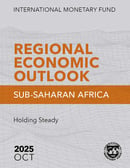This web page provides information in on the activities of the Office, views of the IMF staff, and the relations between the Democratic Republic of the Congo and the IMF. Additional information can be found on the Democratic Republic of the Congo and IMF country page, including official IMF reports and Executive Board documents in English and French that deal with the Democratic Republic of the Congo.
At a Glance
- Current IMF membership: 191 countries
- The Democratic Republic of the Congo joined the Fund in September 28, 1963.
- Total Quotas: SDR 1066.0 Million
- 2024 Article IV Consultation: July 15, 2024 (Country Report No. 24/226).
News and Highlights
Advertisement for a new local economist in our local office in Kinshasa (français)
The IMF office in Democratic Republic of the Congo is recruiting a new local economist. Apply by December 9, 2024.
November 25, 2024
IMF Staff Concludes Technical Assistance Visit to the Democratic Republic of Congo (français)
End-of-Mission press releases include statements of IMF staff teams that convey preliminary findings after a visit to a country. The views expressed in this statement are those of the IMF staff and do not necessarily represent the views of the IMF’s Executive Board. This mission will not result in a Board discussion.
October 26, 2023
Déclaration du chef de mission du FMI en République démocratique du Congo
La cheffe de mission du Fonds monétaire international pour la République démocratique du Congo, Mercedes Vera Martin, souhaite faire la déclaration suivante : "Lors d'une réunion tenue le jeudi 27 avril 2023 avec le vice-premier ministre de la Défense Monsieur Bemba, les discussions ont porté sur la nécessité de contrôler et de hiérarchiser les dépenses, y compris les dépenses liées à la sécurité, compte tenu de l'espace budgétaire restreint, et sur l'importance de renforcer la gouvernance pour soutenir l'efficacité des dépenses."
April 28, 2023
Statement by the IMF Mission Chief for the Democratic Republic of the Congo
The mission chief for the Democratic Republic of the Congo, Mercedes Vera Martin, would like to make the following statement: “In a meeting held on Thursday April 27 2023 with the Vice-Prime Minister of Defense Monsieur Bemba, the discussions focused on the need to control and prioritize spending, including security-related spending, given the limited fiscal space, and the importance of reinforcing governance to support spending efficiency.”
April 28, 2023
This visit, in response to an invitation from the President of the Republic Felix Tshisekedi, was the first to Africa since the outbreak of the Covid-19 pandemic. During her visit, the managing director and her delegation (African Department Director Abebe Aemro Selassie, Mission Chief for the DRC Mercedes Vera-Martin, Communication Department Division Chief Alistair Thomson, Advisor Aleksandra Zdzienicka) met with President Felix Tshisekedi, Prime Minister Jean-Michel Sama Lukonde, Governor Malangu Kabedi-Nbuyi, State Minister and Minister of Budget Aime Boji Sangara, Minister of Finance Nicolas Kazadi, and representatives of the civil society, the private sector, and development partners. During this important visit, Kristalina Georgieva acknowledged the DRC’s economic potential, congratulated the authorities on the satisfactory start of the ECF arrangement, called for decisive implementation of structural reforms to boost growth, mobilize revenues, enhance the independence of the central bank, and promote better governance and transparency. She also emphasized the challenges of the energy transition process for the DRC. The managing director also made a donation on behalf of the IMF Giving to the Fund for Congolese Women, represented by Julienne Lusenge, to support local women’s initiatives.
December 7, 2021
The Democratic Republic of the Congo and the IMF
No results found. Either there was an error with the web service or there is no data returned by the web service.
Regional Economic Outlook for subsharan Africa
October 16, 2025

The outlook for Sub-Saharan Africa is showing resilience, despite a challenging external environment with uneven prospects in commodity prices, still tight borrowing conditions, and a deterioration of the global trade and aid landscape.
Read the Report
Fraudulent Scam Emails Using the Name of the IMF
For more information please see Fraudulent Scam Emails Using the Name of the IMF
Departmental Papers on Africa
 The Departmental African Paper Series covers research on sub-Saharan Africa conducted by International Monetary Fund (IMF) staff, particularly on issues of broad regional or cross-country interest. The views expressed in these papers are those of the author(s) and do not necessarily represent the views of the IMF, its Executive Board, or IMF Management.
The Departmental African Paper Series covers research on sub-Saharan Africa conducted by International Monetary Fund (IMF) staff, particularly on issues of broad regional or cross-country interest. The views expressed in these papers are those of the author(s) and do not necessarily represent the views of the IMF, its Executive Board, or IMF Management.



